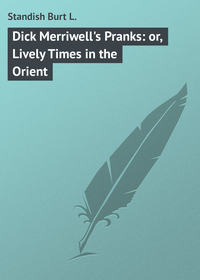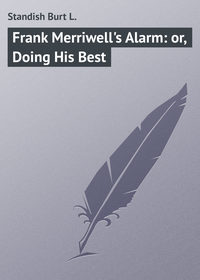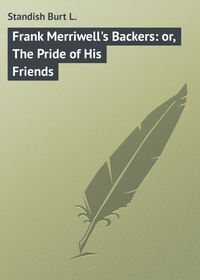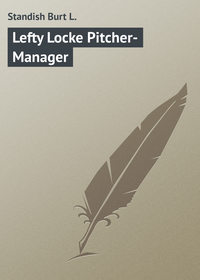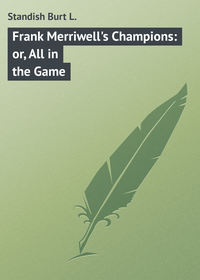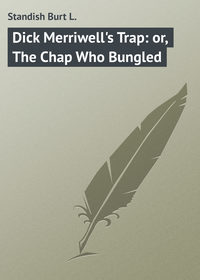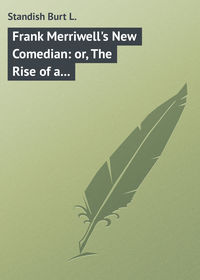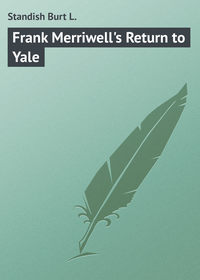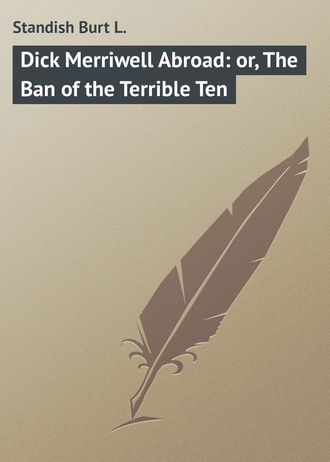 полная версия
полная версияDick Merriwell Abroad: or, The Ban of the Terrible Ten
Dick sprang down from his horse, giving the bridle into the hand of his companion. With his finger he swiftly drew a crude picture in a patch of dust beside the road. It was the picture of a closed carriage.
The beggar understood in a twinkling. He nodded excitedly, jabbering in his own language and motioning for the boys to follow him. Turning, he ran to the point where the road disappeared round the shoulder of the bowlder, pausing again to beckon them on.
Merriwell leaped into the saddle and the two lads rounded the rock at the heels of the beggar. The man pointed along the road, and amid some bare trees on a slope half a mile away the carriage was plainly seen, a tiny cloud of dust rolling up behind it.
“Whoop!” shouted Buckhart. “There she is, pard! We’re still on the trail!”
They did not pause to thank the beggar, but were off down the hill, the hoofs of their horses ringing clear on the hard and stony road.
It was dangerous to ride as they rode, for that strip of road was anything but good. Still they took chances and dashed onward.
It seemed that some one in the carriage observed them, for they soon decided that the horses attached to the vehicle had been forced to greater speed.
“But they can’t get away from us now!” declared Dick grimly.
“What will we do when we overtake them?” questioned Brad.
“We’ll hold them up and find out what they are trying to do with Flavia.”
“It’s a whole lot queer they were able to get away from that hotel and out of the city without any of that bunch of Greeks interfering.”
“I’ve been thinking of that. After following them to the hotel, it seems that Maro, Tyrus, and their friends quit.”
“I certain am afraid the Greek of to-day is a sure enough quitter.”
“Look, Brad – look at the road yonder!”
“Horsemen, partner, and they’re riding good and hard.”
For a few moments a number of horsemen were in plain sight on another road, and it was plain that they were pushing their mounts. They soon disappeared from view behind an intervening ridge.
“They were Greeks,” said Dick.
“Sure thing.”
“The carriage has disappeared.”
“That’s right.”
“Brad, I think the road those horsemen were following intersects this road somewhere beyond that ridge.”
“I judge she does.”
“The occupants of that carriage could not see those horsemen.”
“Because the ridge shut out the view of the other road.”
“Exactly. But I think the horsemen knew the carriage must come round that ridge at the western end, and I believe they mean to intercept it where the roads cross.”
“Partner, I allow you have figured it out proper. That being the case – ”
“Tyrus and Maro are leading the horsemen.”
“I’ll bet on it.”
“In which case there is liable to be bloodshed. Camberwell and Cavendish may be butchered by the engaged uncle and lover.”
“That’s whatever.”
“They may deserve it, but still it’s our duty to prevent it, if possible.”
Even while riding at full gallop the boys had managed to carry on this conversation. But now, as they reached the last declivity of the road, and were descending into the valley between the two ridges, Dick’s horse stepped on a loose stone and fell as if shot.
Had not Merriwell been an expert horseman that accident might have been fatal. He shot over the head of the horse, having managed to free his feet from the stirrups with the quickness of thought itself. Striking on his feet, he managed to keep up for two springs, and, when he did fall, he regained an upright position and wheeled so swiftly that it was almost impossible to say that he had been down at all.
As the horse rose Dick had the creature by the bit and was talking soothingly to it.
Having uttered an exclamation of dismay, Buckhart reined in as soon as possible and turned about. An expression of relief shot over his rugged face as he saw his friend on his feet, holding the frightened horse by the bit.
“Good work!” shouted the delighted Texan. “It certain takes more than a little thing like that to put you down and out, partner.”
Dick managed to fling himself into the saddle. As his feet found the stirrups once more, he waved his hand to Buckhart.
Brad wheeled his own horse as Merriwell came alongside, and they were off again, making for the rise beyond the hollow.
Dick, however, quickly made an unpleasant discovery. His horse had been injured, and quickly showed signs of lameness as they struck the rise. In fact, the creature limped and betrayed signs of distress, beginning to fall back.
“Hard luck, Brad!” said Dick. “The beast is hurt, and will be scarcely able to hobble in a few moments.”
The other boy drew up somewhat, turning his head to anxiously regard his friend’s faltering mount.
“That’s right,” he said. “At first I reckoned you both had come through all right. If the horse is that lame as quick as this, it will be plumb done up in ten minutes’ time.”
“I’m afraid we won’t be on hand when the pursuers stop that carriage. Ten to one I’ll ruin this horse if I try to push him.”
Always sympathetic for dumb beasts, Dick was hurt by every hobbling stride of the animal he bestrode.
“Keep him going, pard,” urged the Texan. “This is a right desperate case, and you’ll not be to blame for the horse if he is ruined. I’m some anxious to see that the Maid of Athens gets a fair deal in the game, and I’m afraid the cards are stacked against her.”
So Dick urged the faltering horse onward, and they toiled up the road on which they had last seen the closed carriage.
Suddenly from beyond the ridge came electrifying sounds. The air bore to their ears the distant barking of firearms.
“I judge the scrimmage is on, Dick!” palpitated Buckhart. “The battle is taking place and we’re not in it. What a howling shame!”
“Wait, Brad!” cried Dick. “I’ve got to quit this horse. Your animal must carry us both.”
He leaped to the ground as the Texan pulled up. With another bound he was up behind the Texan. The lame horse was abandoned.
“Git!” cried Buckhart.
The animal bearing the double burden responded nobly. Up the road and round the shoulder of the ridge they went.
The shooting had ceased as suddenly as it began. All was silent before them. That silence was ominous.
“I’m afraid we’ll arrive too late,” said Dick regretfully.
Soon they were dashing down the road. To the left they caught a glimpse of another brown highway, the one on which they had seen the galloping horsemen. It was plain that the two roads met not far beyond.
They had made no mistake in thinking it the purpose of those horsemen to intercept the carriage. The sound of firearms had told them that the meeting was not of a peaceful nature. Dick dreaded yet was anxious to know the result.
Beyond and beneath them was a gloomy hollow. But for the clatter produced by their own horse, they might have heard the echo of hoofbeats receding and dying out in the distance of that hollow. The nature of the landscape concealed from their eyes the road that led through it and into the rugged hills beyond.
Soon they came dashing into view of the carriage they had pursued. It was overthrown on its side. One of the two horses that had drawn it was down. The driver had managed to clear the other animal, which was taking all of his attention. He was the only human being in sight. As they came on, he gave them an apprehensive look, seeming on the point of abandoning the horse and taking to his heels.
“There sure has been the old blazes to pay there, Dick!” cried Brad.
All at once, as they drew near, out from the wreck of the carriage leaped a puff of smoke. A pistol spoke and a bullet sung unpleasantly near the boys.
“Mighty bad shooting,” observed the Texan.
He flung the horse to a stand. Dick was the first to leap to the ground. Advancing toward the carriage, peering forth from which he caught a glimpse of an ashen face, he cried:
“Let up on that carelessness! Are you trying to shoot up friends?”
Immediately the head and shoulders of a man rose through a shattered door of the carriage.
It was Sir Augustus Camberwell, and his whole appearance was that of a man so badly frightened that he was liable to do almost any freakish thing. He held in his hand the pistol with which he had fired at the approaching lads. A bit of smoke still curled from the muzzle of the weapon.
“Really is – is it you – my – my dear boys?” he chattered, seeming to shake all over like a man with the palsy. “I – I thought it was – those ruffians returned to – to finish me up, don’t you understand.”
“Yes, we understand,” said Dick. “You lost your wits completely. Lucky for us that your hand shook so you couldn’t hit a house when you fired.”
“I – I hope you will pardon me.”
“We’ll have to. What’s happened here?”
“Ruffians, highwaymen, cutthroats dashed upon us! Shot down one of our horses! Tried to murder me! Fell on Cavendish and dragged him forth! Seized the girl! Upset the carriage! That’s about all I know, don’t you know. I’m hurt. I fancy they thought me killed. I kept still. They left. Cavendish is gone. Girl is gone. Confound the girl! She made all the trouble. Cavendish was a fool! I told him so.”
“Why did you leave Athens?”
“Dangerous there. Greeks followed us to hotel. Knew a quiet place in a little village where Charlie and the girl could stay till he got ready to quit his foolishness. Thought the Greeks had gone to notify the authorities, and raise a row. Thought they were satisfied after they found where we were stopping. Saw nothing of them. Improved the opportunity to get away.”
It was not the habit of Sir Augustus to express himself clearly and concisely, but his condition of nervousness seemed to jerk the words out of him in an astonishingly crisp manner.
“What do you mean by saying that Cavendish and the girl could stay in your quiet little village until he quit his foolishness?” demanded Dick. “Do you intend to convey the idea that he was not going to marry Flavia?”
“Marry her?” cried Camberwell. “How ridiculous! Why, he would disgrace his family, don’t you know!”
Dick Merriwell’s eyes blazed with anger.
“Then it is evident at last that Charles Cavendish is as great a scoundrel as Sir Augustus Camberwell!” he said, in deep disgust.
“What, sir – what?” gasped the Englishman, in astonishment. “How dare you use such language to me!”
“Give it to him, pard!” advised Brad, who was standing near, holding the horse. “Tell him a few things good and plain.”
“You got off too easily,” said Dick. “They should have hanged you to the limb of a tree – and Cavendish with you!”
Sir Augustus choked and spluttered.
“Do you know whom you’re addressing?” he fumed.
“Yes; I’m addressing an old reprobate – a miserable old toad! I know your record, Camberwell. I know that you disgraced your family in England. I know you have left a track of wretchedness and ruin behind you all through life. And now you connive with a young reprobate to deceive an innocent and trusting girl! You plot to break her heart and destroy her! I cannot find words to tell you exactly what I do think of you. You ought to get twenty years in a Greek prison – you and Cavendish.”
“Be careful!” snorted Sir Augustus, rising to his full height and clambering forth from the smashed carriage, while he shook his pistol at the daring American lad. “I have money and influence – and friends in Greece.”
“I don’t care what you have; you have entered into a dastardly plot, and I hope to see you properly punished.”
“I knew nothing of it to begin with,” averred the Englishman. “Charlie sent for me. I was his father’s friend. Of course, I brought my influence to bear to have him released. I had no part in forging the letter. That was done before I knew Cavendish was in Athens. The girl knew the letter was forged. Don’t think she is such an innocent little – ”
“That’s enough!” blazed Dick, taking a step toward the man.
Involuntarily Sir Augustus lifted the hand that contained the pistol. Like a flash the boy grasped the weapon, turned its muzzle aside and wrenched it from the grasp of the Englishman.
“You’re not fit to handle such dangerous playthings,” he said.
Brad had made a move to assist Dick, but he stopped, a grim smile on his face, for he saw his friend needed no aid.
“Why – why, you’re worse than the ruffians!” gasped Sir Augustus.
“Look here,” said the fearless American boy, “you had better keep a decent tongue in your vile mouth! Don’t say a nasty word about Flavia, unless you’re anxious to get hurt. Cavendish is a rascal, like yourself. He has led her to believe it is his intention to marry her. There is no question about that, for she told us so. She has fled from Maro, who would have married her any day, to this English reprobate, who only means to deceive her. But I fancy that Cavendish will get all that’s coming to him, for doubtless both Maro and Tyrus, the uncle of the girl, are with the band that dropped on you here. It is mighty doubtful if you ever set eyes on Charles Cavendish again.”
“If they dare injure him they’ll suffer for it!” cried the Englishman. “If they are wise, they’ll set him free without delay. I hope they do keep the girl, for he’s crazy over her, and I can’t swear he wouldn’t be foolish enough to marry her.”
Dick turned in disgust from Camberwell to the driver, who stood looking down mournfully at the dead horse.
“Can you speak English?” asked Merriwell.
“I spik it well,” was the answer.
“Who attacked you here?”
“It was Donatus.”
“Who is Donatus?”
“You never hear of him?”
“No.”
“He outlaw. One time Suliote chief. Price on his head.”
“And this outlaw, Donatus, led the men who attacked you here?”
“I have said it.”
“How did he happen to be so near the city?”
The driver shook his head.
“Some time he come into city. See hills yonder. He stay there much. Think he go there now. Take Englishman. Englishman have friends perhaps. They pay Donatus well if ever see him ’live again.”
“It’s right evident,” said Buckhart, “that Mr. Cavendish is in a very bad scrape.”
“As he richly deserves to be,” declared Dick.
CHAPTER XXVIII. – DONATUS, THE SULIOTE
Amid the wild and rugged Grecian hills lay a sheltered and secluded valley. Indeed, this valley was so secluded that a wandering traveler might chance upon it only by the rarest accident. All things favored the probability that he would pass near without ever dreaming of its existence.
It was night, and in this valley a fire burned, casting its shifting lights on the faces of a small band of men. In all there were eight. Kirtled, bearded, unkempt, picturesque ruffians they were, every man of them fully armed and looking the thorough desperado and cutthroat.
They lounged about the fire in various attitudes, with the exception of one who, at a little distance, walked back and forth in front of the black mouth of a cave. The latter was a guard.
The night wind had a chill in it, and they drew their robes about them, moving yet a little nearer the fire.
Two of them seemed unprepared to spend any time at night in lying before a fire in the open air, for they were unprotected save by their ordinary clothes. One was a man of forty-five, the other a youth of twenty-one.
The first was Tyrus Helorus; the second Maro Veturia. Finally the young man spoke to the other in a low tone.
“It is now nightfall, and there can be no further danger that possible pursuers might see us leaving this place. Let us be going.”
“Be patient,” answered Tyrus, in the same guarded tone. “When he is willing that we should depart, my friend, Donatus, will speak. He is buried in thought now.”
As he said this, he shifted his position slightly in order to observe the figure of a bearded man that reclined on his elbow almost opposite them, gazing straight into the changing flames. The figure was massive, yet graceful. The curling beard was dark, as were the eyes. His face was that of one used to command. It was cruel, yet in a way strikingly handsome.
This was the man who called himself Donatus and who dared lead his lawless band to the very gates of Athens. Indeed, for all of the price on his head, it was said he often entered the city unaccompanied.
Donatus was a Suliote, at one time a chief, but robbed of his power by the government which refused to recognize his authority and which dispersed and intimidated his followers. In vain he had sought to return to the old ways of living. Being baffled, he became an outlaw indeed, preying on his fellow men. With the exception of Tyrus and Maro, these were his followers.
“I like not that look on his face,” muttered Maro. “I don’t know why I fancy it, but I’ll swear he is thinking of my Flavia this minute.”
“Hush!” cautioned Tyrus, in alarm. “Be careful what you say, if you value your life!”
Suddenly, like a flash of lightning, the dark eyes of Donatus were lifted and fastened inquiringly upon them.
“Why speak in whispers, Tyrus, my friend?” he demanded, using the Romaic speech, with which he did not seem wholly familiar. “If you have anything to utter, you need not fear to speak out.”
Instantly Tyrus would have risen, but the chief made a gesture that bade him remain as he was.
“We did not wish to disturb you, chief,” asserted the elder Greek: “It was plain you were buried in thought.”
“I was. I was thinking of my youth and of my home far from this spot. For some time I have longed to return there, Tyrus; but I have not wished to go empty-handed.”
“By the stories they tell of you, you should have riches to-day.”
Donatus made a slight, careless gesture with his hand.
“Who gets money as I have and keeps it?” he said. “It is a desperate and precarious life, Tyrus, and the rewards do not compensate for the dangers. I came to Athens to seek certain men of influence to interpose in my behalf and seek for me a pardon, with the understanding that I should forever abandon the life I have led in recent years. Chance threw me in with you, a friend who once concealed me when armed enemies were close on my track. I promised you then that if the opportunity ever came Donatus would repay the debt. You appealed to me in your distress, saying the Englishmen had stolen your niece.
“I called some of my followers, who in disguise had entered the city with me. If you had advised it, we would have attacked the Englishmen then and taken the girl from them. But you were afraid, Tyrus, that it would create an uproar, and as a result that it must become generally known that you had consorted with Donatus, the outlaw. You said wait, and we waited. Fortune came our way, for the Englishmen fancied they saw their opportunity to escape with the girl, and they lost no time in trying it. We were watching every move, and they played the game to suit us when they hastened with the girl from the city. In the open country we could work, and we did work. One poor fool of an Englishman we left on the road, permitting him to think he had deceived us, while, at your suggestion, we took the other one. He is now a prisoner in the cave yonder, where also the girl is safely stored.
“I am sorry, Tyrus, that I could not please you and your young friend by cutting the young Englishman’s throat. Had I known that was why you wished me to carry him off, I might have left him behind with the old fool who played that he had been killed, when we took good care to kill nothing save a horse. But now I am glad that we took the trouble, for one of my men tells me he is the son of an aristocrat and that the man we left behind is rich. It is well. A satisfactory ransom must be paid before the young Englishman is set at liberty. Thus through a friendly act I shall be able to turn an honest coin. Already I have dispatched a faithful fellow who bears a message to the other Englishman, stating that when I have received ten thousand drachmas I will set my captive free.”
“If you get it, you will not return empty-handed to your home,” said Tyrus.
“It was not of money I was thinking when I spoke thus,” asserted Donatus. “I am getting on in years. Long have I dreamed of an ideal who should make my home complete by sharing it with me. This day I saw her.”
“A woman?”
“The flower of Greece! I was thinking of her as I gazed into the fire.”
The hands of Maro suddenly closed and a wild light came into his eyes. He rose to his feet.
“Chief,” he said, boldly addressing the Suliote, “if we do not return to Athens ere another dawn, suspicion will fall on us. We must be going.”
“Would you depart so soon? Shall I send one of my men to conduct you and show you the way?”
“If you will.”
The brigand leader rose. There was a pantherish grace in every move, in spite of the fact that he was a large man. He spoke to one of the band, and the fellow sprang up.
“Bion, bring horses for my friends and conduct them on the way until they are safely on the road to the city.”
In a few minutes Bion returned from the darkness, leading two saddled horses. The chief explained that the man would accompany them on foot, being a fleet runner.
Maro had become very nervous. Now he demanded:
“Where is the third horse?”
“The third?” questioned Donatus. “There are but two of you.”
“You have forgotten Flavia?”
“Indeed not. I have remembered her well.”
Maro was pale, holding his excitement in check with difficulty.
“Then I will walk and she shall ride,” he said. “Have her brought.”
Barely a moment did Donatus hesitate, and then he gave the order that the girl be brought.
Soon one of the men conducted her from the cave before the mouth of which the guard paced. She was almost deathly white. Her eyes were wide with fear, but she pressed her lips together and tried to retain command of herself.
Never in all her life had Flavia looked more beautiful than at that moment. Donatus folded his arms on his broad chest and gazed at her with a singular expression in his eyes.
“Maid,” he said, “your uncle and your lover are about to depart. Your lover has demanded that you shall accompany him. Are you ready to go?”
“Come, Flavia!” cried Maro, holding out his hands to her.
She shrank from him.
“No!” she cried; “I do not wish to go with you! I will not go with you!”
With a single stride Donatus reached her and placed his left arm about her with almost crushing fierceness. His other hand he flung out toward Maro.
“You have her answer!” he said. “She remains, and you go without her!”
With a cry of terror, Flavia tried to break from the powerful arm that clasped her. This she could not have accomplished of her own strength, but Donatus released her, and she reeled away.
Maro sprang forward to support her, but she saw him and whirled in a twinkling, rushing back to the protection of the brigand chief, who smiled as he again clasped her with his arm.
“She has made her choice,” he said. And then in a voice unintelligible to them he added: “I shall not return empty-handed to my home!”
Maro was distracted. He clutched Tyrus by the arm, panting:
“Is this your friend? Is this the man whose life you saved? See how he repays you!”
Tyrus was greatly agitated.
“Donatus,” he said entreatingly, “have you forgotten? She is my niece. It is I who have the right to take her.”
“For years,” said the chief, “I have dreamed of her face. To-day I saw it for the first time.”
“But it is not because of you she chooses to stay. She does not understand. She does not know you mean to keep her for yourself. It is the Englishman of whom she thinks.”
“She will forget him soon when he is gone. With the money I shall secure through him I may buy my pardon. She shall be mine!”
Now Flavia did understand, and once more she struggled for her freedom, crying out in her horror of them all.
At this juncture, from some distant part of the valley, came startling sounds. Several pistol shots were fired in rapid succession. In a twinkling every brigand was on his feet, their weapons ready.
Donatus had wheeled toward the sounds, which ceased as suddenly as they began.
Behind the chief’s back Maro seized the girl, hissing into her ear:
“Foolish Flavia! Will you give yourself up to this brigand? Do not think he will let the Englishman have you. He means to keep you for himself.”


